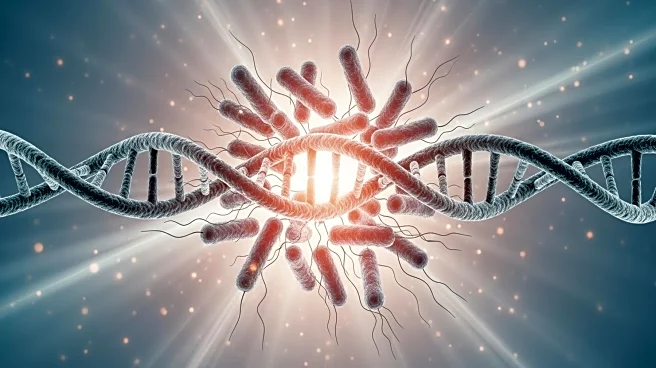What is the story about?
What's Happening?
A research team led by Professor Eijiro Miyako at the Japan Advanced Institute of Science and Technology, in collaboration with Daiichi Sankyo Co., Ltd. and the University of Tsukuba, has developed a groundbreaking bacterial therapy for cancer treatment that functions independently of the immune system. This innovative approach utilizes a microbial consortium known as AUN, which consists of two bacterial strains: Proteus mirabilis and Rhodopseudomonas palustris. The therapy has demonstrated significant tumor clearance in both mouse and human cancer models, even in immunocompromised conditions. This marks a departure from traditional cancer treatments that rely on immune cell activity, offering a potential solution for patients with weakened immune systems due to chemotherapy or radiotherapy.
Why It's Important?
The development of the AUN bacterial therapy represents a significant advancement in cancer treatment, particularly for immunocompromised patients who cannot benefit from conventional immunotherapies. By bypassing the need for immune system involvement, this therapy could provide effective treatment options for a broader range of cancer patients. The therapy's ability to precisely target and destroy tumor vasculature and cancer cells, while minimizing side effects such as cytokine release syndrome, highlights its potential to transform cancer care. This approach could lead to more personalized and effective treatments, reducing the dependency on immune system-based therapies and expanding the possibilities for cancer management.
What's Next?
The research team is preparing to launch a startup to accelerate the implementation of this bacterial therapy in clinical settings. They aim to begin clinical trials within six years, which could pave the way for widespread adoption of this immune-independent cancer treatment. As the therapy progresses towards clinical trials, it may attract interest from pharmaceutical companies and healthcare providers looking to expand their cancer treatment portfolios. The success of these trials could lead to regulatory approvals and integration into standard cancer care practices, offering new hope for patients who have limited treatment options.
Beyond the Headlines
This bacterial therapy not only challenges the traditional reliance on the immune system for cancer treatment but also introduces a novel concept of microbial cooperation in medical applications. The harmonious interaction between the two bacterial strains mirrors the Japanese philosophical concept of 'AUN,' emphasizing balance and cooperation. This approach could inspire further research into microbial therapies for other diseases, potentially leading to breakthroughs in areas where conventional treatments have limitations. The ethical and regulatory considerations of using live bacteria in therapy will also need to be addressed as this treatment moves closer to clinical application.















